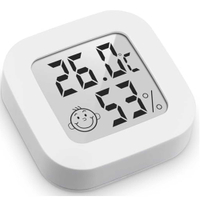5 reasons to buy a dehumidifier in summer not winter, according to experts
Most people splash out on a dehumidifier as soon as that autumn condensation begins to build, but here's why they're more a savvy summertime buy
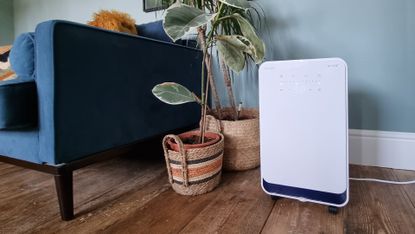

As the better weather arrives and we can finally fling open the windows, all thoughts of buying one of the best dehumidifiers will drift away with the summer breeze. But should that be the case?
It's well known that a dehumidifier is good at drying clothes – but who needs help with that when we're drying our laundry in glorious sunshine outside (probably)? And with fewer extremes in temperature between indoors and outdoors, surely there's less condensation on the inside of windows and walls? Well maybe, but even so, that doesn't mean a dehumidifier can't still be helpful around the home.
We spoke to some well-placed experts, who lift the lid on why the summer – rather than winter – can be an opportune moment to buy a dehumidifier.
5 reasons to buy a dehumidifier in summer
Don't wait for autumn condensation to build – as our experts include Noel Fok, technical manager at dehumidifier manufacturer EcoAir, and Joshua Warren, dehumidifier expert at AO.com who make a strong case for why a dehumidifier is a savvy summertime buy.
1. Humidity could still cause mould and damp
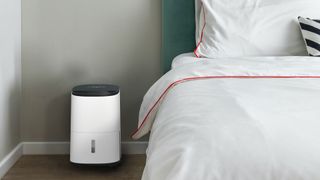
While damp problems are most associated with winter conditions, it doesn't mean they can’t still occur during the summer months. Persistent problems such as damp patches, mould and even rot don't automatically disappear because the seasons change, they can all occur at any time throughout the year.
Condensation and mould growth can still occur in dry weather if a property isn't adequately ventilated, while heavy amounts of rainfall can make damp issues worse. As Noel Fok says, "Just because you can't see condensation, it doesn't mean that the humidity issues aren't there." Meaning you may still need measures to prevent condensation on windows and walls.
"Mould grows at a relative humidity of around 68%," explains Chris Michael, managing director of dehumidifier manufacturer Meaco. "During very warm summers, the outdoor relative humidity is very often much higher than that and it will remain so as the weather stays hot.
Sign up for the woman&home newsletter
Sign up to our free daily email for the latest royal and entertainment news, interesting opinion, expert advice on styling and beauty trends, and no-nonsense guides to the health and wellness questions you want answered.
But at this time of year, we do not tend to have our heating on and therefore there is nothing to remove the moisture from the air that comes into the house. This air comes in through our open windows and doors and is far more likely to cause mould growth than the air that comes in during the winter."
"So, buying a dehumidifier for the spring and summer, even if you always have the windows open, is a good idea. It will help to reduce the incidence of mould, which in turn is a positive thing for health issues like asthma."

Chris Michael is the expert co-founder of Meaco. Since its launch in 1991, Meaco has become a leading UK provider of air treatment products and the brand’s products have won a wealth of industry and design awards internationally.
"High humidity creates excess moisture and condensation that can potentially lead to water damage, so it’s important to keep humidity levels low at all times of the year," agrees Katharine Allison, an expert at Independent Advisor Windows. "It's therefore still important to use a dehumidifier in summer to maintain optimal indoor humidity levels, particularly in areas with poor ventilation or high moisture content.'
Bedrooms with en-suites, bathrooms, kitchens and basement and attic rooms are particularly susceptible. Consider the best dehumidifier for a bedroom or the best dehumidifier for bathrooms.
Top tip: Not sure you need a dehumidifier at home? Before you invest, Noel Fok suggests you buy a "cheap as chips digital hydrometer, which you can pick up for around £6'. 'If it regularly reads over 60% humidity, get a dehumidifier," he says.
Digital Hygrometer Indoor Thermometer, Was £6.59 now £4.99 at Amazon
This handy, affordable digital hygrometer tool is what Noel recommends buying to accurately gauge temperature and humidity levels around the home – a valuable thing you need to know before buying a dehumidifier.
2. Opening your windows may not be practical

"So that humidity doesn't get trapped in the house, the obvious thing to do during the summer period is to open your windows and have a breeze going through it," says Noel Fok the recommended ways to keep a room cool without an AC. "Nowadays, most homes are built in such a way that keeps heat and humidity in, so it needs to get out."
"But a lot of people, particularly in urban areas, do not want to open windows because of air pollution, noise from traffic, for security reasons, or because they have air conditioning running. That's where a dehumidifier can help."
3. There will still be rainy days
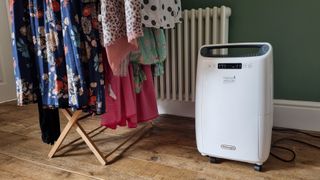
We hate to break it to you, but not every day is going to be a winner, weather-wise. There will still be rainy days – or, let's face it, rainy weeks – when it's impossible to get the washing dry outside.
Granted, it will be warmer so things might dry a little quicker, even indoors, but not as quickly if you turned on the dehumidifier. Remember also that it'll likely be too hot to use your best-heated clothes airer as a useful aid.
Also, wet laundry will still make the air in your home more humid, leading to the damp problems we've mentioned above. Now, you could chuck everything in a tumble dryer. But this can be costly.
"A dehumidifier is usually rated at between 270-300W, whereas tumble dryers are rated at over 1,000W, so you'll save a lot of money by using a dehumidifier to dry washing, even if it takes a little longer," says Noel Fok.
"Also, you wouldn't want to put delicates into a tumble dryer, but you would be happy to hang them up and let the dehumidifier extract the humidity from the air to dry the clothes. It's a much gentler process."
Finally, you might not have a garden in which to dry your washing, or you might want to put laundry outside if you live in an area with high air pollution, or when then neighbours are having a barbecue and there's smoke in the air. In all these cases, drying clothes indoors with a dehumidifier may be better.

Our MeacoDry ABC 12L review concluded this model was the best for drying clothes and laundry indoors. Our tester tried drying clothes which would normally need 14-36 hours and found that the very same washing pile was iron-dry within as little as six hours.
4. They can help with allergies like hayfever
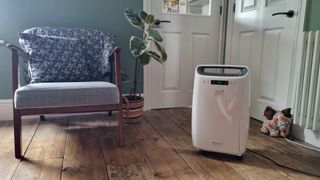
Do you suffer from hay fever or other allergies? You're not alone, and your numbers are growing. A recent report by the University of East Anglia reveals that by 2050, the estimated number of people suffering hay fever from ragweed pollen in Europe could double from 33 to 77 million people. Meanwhile, the NHS advises that asthma can be triggered by 'thunderstorms, heat and humidity'.
So if you suffer from either – or both – conditions, it's prudent to try and keep the air free of pollen and not overly humid if you can. The United States Environmental Protection Agency suggests an indoor relative humidity (RH) of below 60 per cent – ideally between 30 per cent and 50 per cent.
'Looking ahead to the warmer months, this is truly where a dehumidifier comes into its own – particularly for those suffering from allergies,' confirms Joshua Warren. 'If you’re perhaps a person who struggles with hay fever, look out for dehumidifiers with a HEPA filter as these models are specialised in improving air quality by removing allergens.'
So even if your house isn't too humid, certain dehumidifiers can still help if they are fitted with an air purification mode and a HEPA filter. Several models offering this function are the following...
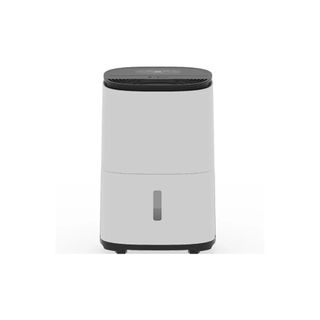
After carrying out the MeacoDry Arete One review our tester found it to be an all-around great dehumidifier that is super easy to use and therefore great for those who are new to the world of dehumidifiers. Not only is it simple to use it's also quiet and features a laundry mode, to eliminate wet clothes causing problems around the home.

This affordable smart dehumidifier and air purifier model features a built-in HEPA 11 filter that helps to improve air quality in your room by effectively trapping allergens. Its generous 3.2-litre tank can extract up to 450 ml of moisture per day – perfect for avoiding mould in small spaces.
These will either let you set the humidistat high enough so that you won't make the air too dry or let you shut off the dehumidifier function completely. You can then use the air purifier mode to draw in the air, capture any floating particles like dust, smoke and – importantly – pollen, and then pump out the clean air.
This can alleviate your hay fever and other allergy symptoms without you needing to have a separate appliance. Then, come winter, you can kick back into dehumidifying mode again.
One important thing to check is that the filter is HEPA certified rather than HEPA 'type'. A true HEPA filter meets ISO European standards that say it will remove at least 99.97% of tiny particles with a 0.3 µm (micron) diameter. Other filters may not be as thorough, so shop wisely.
5. They can make you feel cooler
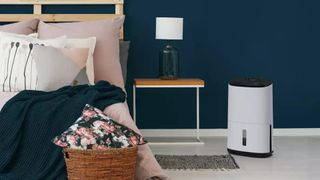
If you want to debate the merits of air conditioners vs dehumidifiers in depth, we've got you covered. But in a nutshell, while dehumidifiers don't technically lower the temperature of a room as an air conditioner would, they can help you feel cooler. This is a phenomenon this writer has experienced when trying to keep a bedroom cool in summer – and I've asked Noel Fok if there's any science behind this.
"Yes, it's true that while they don't technically cool the air, dehumidifiers can make you feel cooler," he says. "This is because humidity makes the air quite 'heavy' due to its water content. The faster air moves, the cooler it feels – that's why fans work. And when you take the water content out of the air, it will be lighter and even freer to move quickly, so feels even cooler against your skin."
"By making the air drier and by circulating the air, our body’s perspiration will evaporate better so we should feel more comfortable, even if the temperature is not reduced,” explains Nicki Bourlet, home appliance expert at Currys. You'll still need a fan or AC on a very hot day, but it can make a pleasant difference otherwise.
So if you are thinking of investing in a dehumidifier, there's no need to wait for the condensation to arrive. Buying one in summer could leave you feeling less clammy, sneezy and irritated by noise. And it could save you money on those rainy laundry days. Not to mention the savings you could make by shopping out-of-season dehumidifier deals.

Amy is a PPA award-winning Digital Editor who has been working in the wonderful world of interiors for over 16 years. She has worked on titles including Inside Readers’ Homes, Inspirations for Your Home, Country House & Home and 25 Beautiful Kitchens magazine. After a stint on Beautiful Homes, she joined Ideal Home in 2010 as a Consumer Editor, then Technology Editor where she was better known as 'Girl About Tech' to prove her credentials as a product expert before landing the role of Digital Editor of Ideal Home in 2017.
Amy now works freelance across leading world-renowned Homes & interior titles such as Homes & Gardens, Real Homes and Ideal Home.
-
 Keira Knightley styles the best chocolate brown blazer with a blush pink skirt, coffee tone jumper and white slingback heels
Keira Knightley styles the best chocolate brown blazer with a blush pink skirt, coffee tone jumper and white slingback heelsAn oversized blazer is the answer to our cold-weather styling dilemmas
By Molly Smith Published
-
 Shetland season 9 ending explained: Who murdered Annie and Bergen?
Shetland season 9 ending explained: Who murdered Annie and Bergen?We delve in the Shetland season 9 final episode to unpick everything happened, and find out who was responsible for the death of Annie and Bergen.
By Lucy Wigley Published
